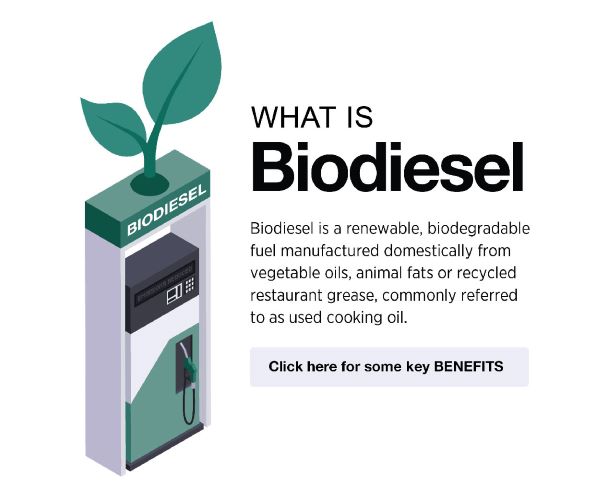What is Biodiesel?
Biodiesel is a renewable, biodegradable fuel manufactured domestically from vegetable oils, animal fats or recycled restaurant grease (commonly referred to as used cooking oil).

Three facts about biodiesel
1. Biodiesel is one of the easiest, most effective fuels for reducing lifecycle carbon emissions.
2. Biodiesel is a lower carbon fuel that can help provide strong fleet performance.
3. Biodiesel is a drop-in fuel.
How does biodiesel differ from petroleum diesel?
Biodiesel is made from renewable resources that are largely plant-based, with their energy coming from the sun instead of fossil fuels. These feedstocks are diverted waste or byproducts from other industries, providing a new use rather than going to a landfill. That helps biodiesel emit less greenhouse gases. In fact, biodiesel’s lifecycle greenhouse gas emissions are estimated to be up to 88% lower than those of petroleum diesel.
Biodiesel is a drop-in fuel that can be used in most existing diesel vehicles and fueling infrastructure, giving diesel fleets a solution for lowering carbon emissions quickly with their existing equipment.
Compared with petroleum diesel, biodiesel fuel can also help performance through higher Cetane, added lubricity and a lower carbon burn that puts less stress on diesel particulate filters.
Biodiesel is the fuel that can bring all these benefits to retailers, wholesalers and to fleets in most segments including: trucking, marine, rail, construction, mining and agriculture.
Benefits of biodiesel
1. Lower engine emissions specifically for hydrocarbons and particulate matter. Oxygen in the molecule helps combustion be more complete, alleviating a high percentage of carbon emissions from unburned or incompletely burned fuel. More complete combustion typically means less carbon monoxide, lower hydrocarbon emissions and lower particulate matter emissions.
2. Sulfur is naturally lower with biodiesel so sulfur emissions are reduced by the fact that biodiesel is an ultra-low sulfur fuel.
3. Higher Cetane. The ASTM specification for biodiesel requires a minimum Cetane number of 47 compared with the ASTM diesel spec of only 40. Higher Cetane equals a shorter ignition time and better performance.
4. Enhanced lubricity. The process of creating Ultra Low Sulfur Diesel (ULSD) involves removal of the sulfur in diesel fuel, resulting in a reduction in the lubricity of the fuel. Blending as little as 2% biodiesel replaces that lubricity which helps performance. Modern diesel engines rely on fuel to aid in the lubricating process and provide protection against wear and damage. Proper lubricity management can also help engines run smoother, cooler and more quietly.
5. Drop-in fuel. Biodiesel blends typically don’t require vehicle or infrastructure upgrades. Want to start running your tractor-trailer or work truck on B20? Just pump it into your tank.
6. Lower carbon intensity. Biodiesel is a lower-carbon fuel with significantly lower emissions than ULSD. That’s important for companies that are working toward lower carbon targets or haul goods for customers with reduced emission targets. It also may be a requirement for fleets that operate in jurisdictions with carbon-reduction policies, like the Low Carbon Fuel Standard (LCFS) Programs in California and the Clean Fuels Program in Oregon.
7. Can be blended with renewable diesel. Biodiesel can be blended at virtually any level with both petroleum diesel and renewable diesel to achieve a customized fuel blend based on customer needs. For example, 20% biodiesel in petroleum diesel—known as B20—is a common blend level used by many fleets. Biodiesel and renewable diesel have very complementary and distinctly different benefits. Biodiesel provides excellent lubricity, density compatibility and elastomer swell compatibility. Renewable diesel is good for NOx reduction and has high Cetane values.
Biodiesel Performance: Go Inside a Diesel Engine
Increased lubricity. Higher Cetane. Fewer diesel particulate filter problems. These are some of the performance advantages over ULSD that biodiesel can give fleets. Take a look inside a diesel engine to see for yourself.